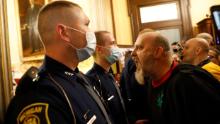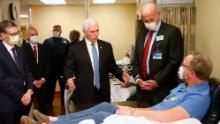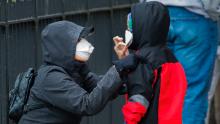Even though wearing masks isn’t compulsory in much of the US, adhering to these rules may feel like, to some, a forfeiture of their freedoms.
People naturally rebel when they’re told what to do, even if the measures could protect them, said Steven Taylor, a clinical psychologist and author of “The Psychology of Pandemics.”
“People value their freedoms,” he said. “They may become distressed or indignant or morally outraged when people are trying to encroach on their freedoms.”
Aronoff compared the mask guidance to the ban on smoking cigarettes in restaurants or schools.
“There are rules about not smoking in enclosed restaurants and bars because that smoke can be deleterious to someone else’s health,” he said. “Now we’re in a situation where, if I’m infected with the Covid-19 virus, my breath can be lethal to someone else.”
But while that legislation is permanent, wearing masks won’t be, Aronoff said.
But to vocal opponents, even temporary guidance is too much of a concession.
Some think it could make them look weak
To some, wearing a mask means admitting a fear they may not have consciously confronted yet, said David Abrams, a clinical psychologist and professor of social and behavioral science at New York University’s School of Global Public Health.
Many view the mask as a walking symbol of vulnerability that tells others you’re scared about contracting the virus. So to compensate for that fear, and as a show of strength, they may reject the masks entirely, he said.
To the people who choose not to wear them, “Putting on that mask is about as blatant as saying, ‘Hey, I’m a scaredy cat,'” Abrams said.
We may owe that particular trait to our animal ancestors — in the mammalian world, species disguise fear and don’t show it with other species to keep themselves safe. It’s an evolutionary trait that might explain our tendencies today, when our collective security is threatened, he said.
Some find the guidance confusing
“It’s confusing for us frontline health care workers, too,” Aronoff said.
And people who followed the CDC’s initial advice — to avoid wearing a mask if you’re healthy — may have felt cheated or wronged when the CDC recommended them in mid-April.
All that muddles the message even further for Americans, Abrams said.
“The ambivalence of mixed messages makes it far easier for people to do whatever they want and make up their own mind,” he said.
Some find it uncomfortable
In the presence of uncertainty, people tend to seek out rituals that make them feel secure. For many Americans, wearing masks in public isn’t one of those, Abrams said.
“When people are told what to do, and it’s not the conforming, usual way to behave, there’s a tendency to question that and to resist,” he said. “It’s the psychological tendency to react to people telling you what to do.”
“If everybody started wearing masks, suddenly, the old way of life is gone,” he said. “You’ve suddenly admitted that this is the new normal. But you don’t want to believe that.”
Not to mention, masks aren’t physically comfortable either. That may be enough to steer some people away from them.
CNN’s Brandon Tensley contributed to this report.



